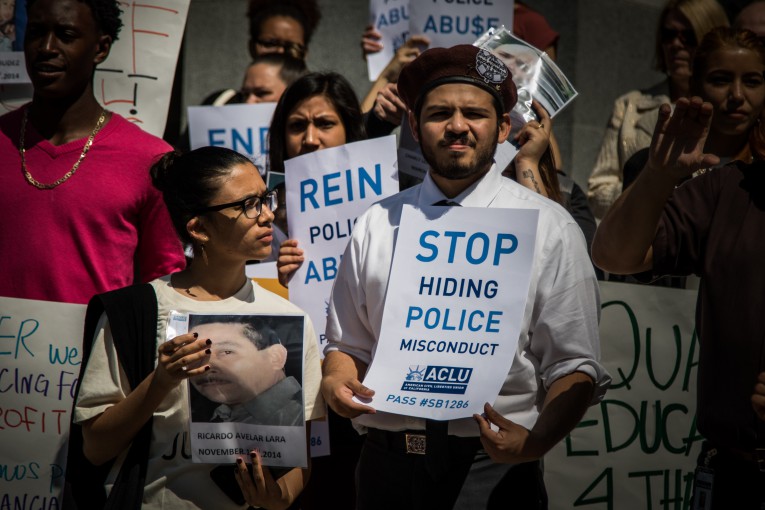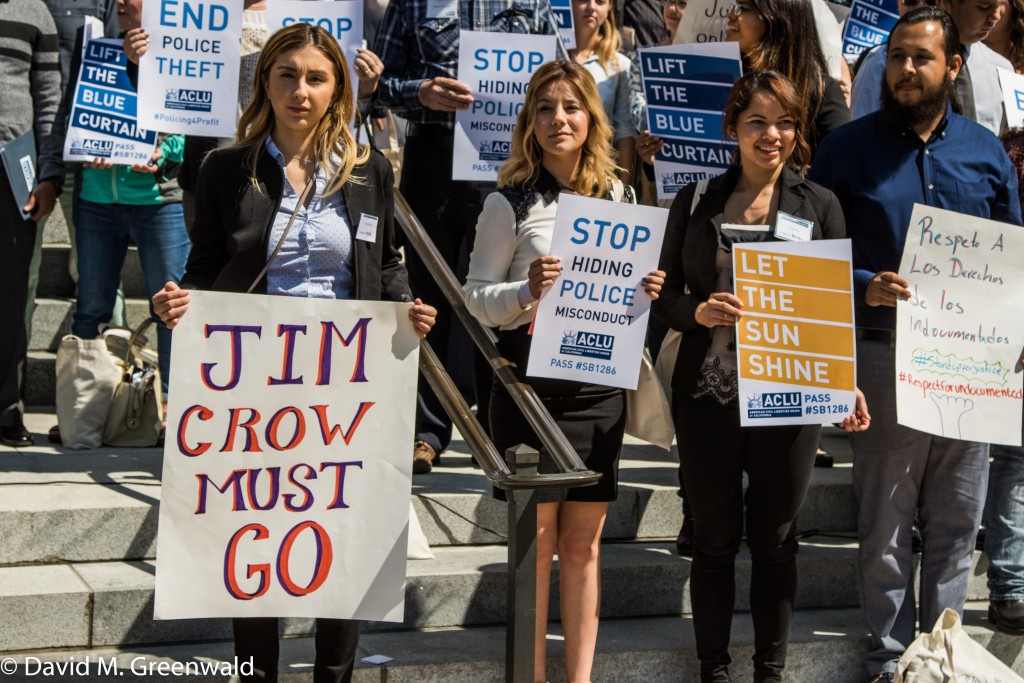

Back in April, SB 1286, sponsored by Senator Mark Leno, passed its first legislative hurdle as the Senate’s Public Safety Committee voted 5-1 to advance the legislation. California lags behind the rest of the nation in transparency when it comes to police misconduct, use of force or other instances of officer misconduct – police departments are not required to give the public access to such records.
All records related to the discipline of police, in contrast to those of other public employees, are absolutely confidential and exempt from California’s Public Records Act. As a result, departments are legally banned from disclosing to the public whether an officer is guilty of misconduct, if said officer was disciplined, or what the discipline consisted of – even if a department or police chief wanted to share that information.
“SB 1286 attempts to rebuild trust between law enforcement and the communities they serve by providing greater transparency and accountability when misconduct is confirmed or use of force is applied,” said Senator Leno. “Our goal is to protect public safety, create safer communities and reduce law enforcement’s use of force.”
On Sunday, the Davis Enterprise in an editorial came out in support of the bill as well, writing, “The Davis Enterprise, a member of the California Newspaper Publishers Association, enthusiastically supports Senate Bill 1286, which would allow public access to records of incidents involving police misconduct and use of force.”
The Enterprise notes that, in 2011, they dealt first-hand with police agencies refusing to release information about police misconduct, as “in the aftermath the 2011 pepper-spraying of protesters by UC Davis police officers, the UCD Police Department not only refused to confirm the identities of the officers involved in the incident, it refused even to acknowledge whether the officers were on the force at all.”
They write, “The ability of police departments to shield themselves from scrutiny does not serve the public interest. Under current law, those who submit complaints against an officer rarely find out what happens after the complaint is filed. SB 1286 would permit complainants to learn about the disposition of their complaint and obtain information about the investigation, the findings and any discipline imposed.”
“This bill would give families who have lost loved ones to police violence the information they need to gain closure and begin healing, something families are currently denied in California. All we want to know is what any grieving family member would want to know: what happened?” said Kim McGill, an organizer with the Youth Justice Coalition.
In the aftermath of countless high-profile officer-involved shootings of unarmed people of color, and as law enforcement agencies throughout the country and state struggle to repair fractured relationships with communities, California forbids law enforcement agencies from even sharing the factual findings in investigations of police shootings.
“This is a great day for any Californian who wants to better understand how police agencies investigate and resolve allegations of police misconduct. This is the first step in restoring people’s faith in the officers that put their lives on the line for us every day,” said the general counsel of the California Newspaper Publishers Association.
SB 1286 would restore police transparency in California by shining light on how police departments handle investigations into officer misconduct and serious uses of force. As indicated, unlike for other public employees, all records related to police discipline are completely confidential and exempt from California’s Public Records Act. As a result, departments cannot disclose when an officer is guilty of misconduct, if corrective action was taken, or what the corrective action was.
“California is behind the times when it comes to providing transparency in law enforcement records,” said Senator Leno in a February press release. “The public has a right to know when officers apply deadly force and when serious cases of misconduct have been confirmed. Failing to disclose such important information can fuel mistrust within our communities and threaten public safety.”
California law keeps records of officer misconduct and critical investigations secret:
- Sections 832.7 and 832.8 of the Penal Code, part of the so-called Pitchess statutes, make all records relating to police discipline confidential and exempt from disclosure under the Public Records Act.
- Courts have interpreted these provisions broadly to bar disclosure of records that could be used to assess discipline, including incident reports, internal investigations, civilian complaints, and other records related to uses of force or investigations into misconduct. This deprives the public of basic information on how law enforcement policies are really applied in critical incidents like shootings.
- Although California law requires that police agencies notify civilians who file complaints about the disposition of those complaints, agencies generally withhold the investigation report, any specific findings made, and any information about retraining, discipline imposed, or other corrective action.
In April, several hundred people rallied on the steps of the Capitol in support of police reform.
Brandy Brown, a member of the Youth Justice Coalition, a youth-led organization co-sponsoring SB 1286, urged the bill’s passing. Ms. Brown told the emotional story of the shooting of Ezell Ford.
She had been friends with Mr. Ford, an unarmed Black man who was shot and killed by Los Angeles Police Department (LAPD) officers in 2014. On the day Mr. Ford was killed, both Ms. Brown’s then one-year-old daughter and her four-year-old nephew were outside on the balcony and saw the police shooting of Ezell Ford not far from where they were playing.
“Senate Bill 1286 is important because we need to know the background of the people who are patrolling our neighborhoods,” said Ms. Brown. “We must pass the bill, because we are fighting for a day when we as young people of color will not be feared, hated, stopped and cuffed, locked up, locked down and locked out. We are fighting for a day when California will not lead the nation in police shootings, for a day when ‘to protect and serve’ doesn’t mean to protect property and serve the rich.”
Supporters of the bill, including Sacramento’s Black Lives Matter chapter, agreed.
“I support SB 1286 because our law enforcement agencies need to aggressively make an effort to regain the trust of communities of color. A huge step toward this is restoring transparency into police misconduct and use of force investigations. Because without transparency, police will never be fully accountable to the communities they serve. And without accountability, there is not trust,” said Tanya Faison, founder of Black Lives Matter Sacramento.
“California is among a minority of states that makes police disciplinary records confidential,” said San Francisco District Attorney George Gascón in a February statement. “If the public can’t determine whether an officer has been disciplined they can’t assess if accountability mechanisms are working. This contributes to the feeling that police departments are hiding something – even if they’re not – which ultimately adds to the mistrust between police and the communities they serve. This dynamic has a detrimental effect on our public safety.”
In order to get SB 1286 passed, the proponents need the support of Senator Lois Wolk, who represents Davis. Please contact Senator Wolk’s office either by phone ((916) 651-4003) or email: senator.wolk@senate.ca.gov and ask her to vote yes on SB 1286.
“Citizens frequently entrust their lives to police officers. In return, we ask for transparency,” said San Francisco Public Defender Jeff Adachi. “Senator Leno’s proposed legislation will allow public access to information regarding officers who have been found to use excessive force and other misconduct. This bill provides potentially life-saving information to citizens while boosting accountability for police departments. In San Francisco, officers with serious misconduct records that should have disqualified them from duty have gone on to harm city residents. Sen. Leno’s bill will help prevent future tragedies.”
—David M. Greenwald reporting

“All records related to the discipline of police, in contrast to those of other public employees, are absolutely (emphasis added) confidential and exempt from California’s Public Records Act. As a result, departments are legally banned from disclosing to the public whether an officer is guilty of misconduct, if said officer was disciplined, or what the discipline consisted of – even if a department or police chief wanted to share that information.”
Always a danger is using a absolute like “absolutely.” Consider as a notable exception to the above the well-founded and frequently exercised “Pitchess Motions,” which gives plaintiff access to police disciplinary records after judicial review for relevancy.
“The ability of police departments to shield themselves from scrutiny . . .”
The tone of this remark as crafted conveys the impression that police departments (note the all inclusive term) find favor with the “ability” to shield, and sinister acts remain hidden.
This is, frankly, a misrepresentation. As the last sentence in the first quote notes, not everybody in law enforcement wants this shield.
The reality is that there are numerous instances where police administrators would dearly love to expose the rogue officer that has been a thorn in their collective sides for years! But they can’t! They lack the ability to expose because were they to do so they would get sued for violation of State law.
I support this legislative proposal. It’s true that police unions oppose this, for the obvious reasons. What is less known is that law enforcement administrators can find many advantages with public access to disciplinary records. Public support for principled police administrators would rise and, ultimately, labor-law restrictions unique to law enforcement would be modified. Chiefs and Sheriffs can then have the tools to make rogue officers go away, one way or another.
Thank you Phil. Have missed your posts!
Well said, Mr. Coleman. I couldn’t agree with you more…
Agree or disagree with Mr. Coleman, his posts are always well thought out and informative.
In this case, I think he raises a critical issue that from law enforcement’s perspective, transparency is in their best interest. How can the citizens trust a process that they are kept in the dark on?